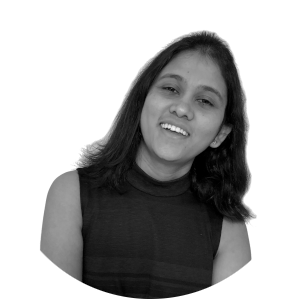Anujaianthi Kuzhandaivel
Feb 13, 2022 / Alumni stories

After having obtained her PhD in SISSA in Neurobiology in 2011 and having done several postdocs around the world, Anujaianthi is now working for the private sector. Along her path she also had to face a pregnancy discrimination. Here is her story.
We are really curious to hear your story. But let’s start from your period in SISSA. What are your memories of that?
For me SISSA is like a second home, where I felt the warmth and I could see rich diversity and inclusion. The people were super nice, and it was easy to connect with students from all the departments. Especially when neuroscience moved from the venue at the Area Research Park to that of via Bonomea in 2010. It was during my last period of PhD. I remember that we used to take walks along the trail close by during the lunch breaks. I love everything about Italy.
What was your PhD project about?
I studied mechanism of acute spinal cord injury in the Andrea Nistri lab: we were interested in understanding what happens immediately following spinal cord injury. This was essential to understand the initial mechanisms that contribute to chronic injury. There was absolute need to revisit the mechanism that happens immediately after the injury as this would play a key role is early treatment plans for any spinal cord injury.
Did you have a good relationship with your advisor?
I had very good relationship with Andrea. For a student who is new to a country and culture absolutely needs great support and motivation from a mentor. I can certainly say I received that support and motivation from Andrea. Andrea is always a great mentor and a human being. I always admired him for the way he treated his students with utmost dignity and grace. He trusted his students, listen to them, motivated them and try out their ideas. I could not have asked for more. He is the best PI and mentor ever I had in my academic career.
After SISSA what did you do?
I did my first postdoc in Sweden at Linkoping University. It was a two-year position and the topic of research was new to me: it was by choice, because I wanted to branch out and learn new
techniques in applied genetics and cell biology. We investigated olfaction, more precisely cellular regulation of receptors involved in smelling. It was a good work experience that led to two articles published in very good journals. I also liked the country, even it was difficult to connect with local people: but once you manage to do that, you are friends for life! And then I got married!
Wow, congratulations!
My husband is also in academia. When I was in SISSA he was in India and then he moved to Japan. Eventually he was able to move to France when I was in Sweden. Then he got a very good offer in the United States and even if I would have liked to stay in Europe, I also looked for a position overseas. We are both very ambitious, but we always support each other and have a mutual understanding.
So you both moved to the US?
Yes, but in different cities: he had a job at the University of Illinois Urbana-Champaign, while mine was at University of Illinois at Chicago as a postdoc. We met during the weekends.
Did you continue working on olfaction?
No, that project was on investigating a group of neurons of particular lineage. These neuron functions were studied predominantly studied in spinal cord. However, they are also present in brain stem where their function is completely different. The PI was interested in understanding their role in the sleep-wake cycle. It was one of the challenging, fun and interesting project: I had to learn new techniques and behavioral studies. I standardized in vivo optogenetics studies in live animals. We did optogenetic stimulation while recording sleep-wake patterns of the animal.This project was quite exciting and I learnt a lot!
And then?
Then unfortunately the lab ran out of funding before the project was over. Though my goal was to leave this lab with a faculty position, I had to leave in 3 years. My third postdoc was at Northwestern University. Here I had an opportunity apply for various funding, however it was impossible to secure one: partly because I was too old to apply for findings. This because to qualify for any early investigator funding I had to be within 5 years of receiving PhD, and this is not easy coming from abroad, since I was in a new system. I thus continued my research and this time on circadian rhythm and Alzheimer’s disease. While continuing my academic research, I was calculating my possibility and chances to get a permanent position in academia. I was wondering if is it really worth my time? Also am I really enjoying what I am doing? The answer was yes! I am always passionate about science and my research, but I did not intend to be a postdoc forever. Also, research is not a 9-5 job. I have a huge responsibility as a single mom. Since my husband lived in another city and we meet only during the weekends, major responsibility of taking care of my kid vested upon me. So the question is: how is my job going to help my family or influence my family health in general?
So what did you do?
I started looking for jobs on LinkedIn and other job websites, but most of the jobs were either lookin for freshers (namely right after your PhD) for which I was too old, or senior positions, for which I was too young. This is something that I would like to suggest to people who want to move to industry: try to have clear thought or ideas in your mind on what your goal is. If it is not academia, do not waste your time (and the PI’s money!) because neither you will be productive nor it will not help you!
So you decided to leave academia and to get a job in industry. What steps did you take?
First thing I did was to identify and recognize the skills I acquired during my years in academia: Critical thinking, Project management, Problem solving, Team management, Decision making, Written communication, Creativity, External collaboration, Goal setting, Ready to try new ideas, Networking, Quick learning etc . I thus started exploring kind of jobs where I could apply these skills: Meanwhile I also started preparing for patent agent.
So then did you apply for that job?
No, because when I was in the process of preparing for that, I got an opportunity to work for a small firm as a competitive intelligence analyst. I was providing this service to big pharmaceutical companies wherein I was a subject matter expert providing consultation comparing their product with their competitive products and how to improve the product. In order to do that I had to read a lot of research articles, white papers, press release, attend conferences and be well informed and on top of it. It was interesting because I had the possibility to get to know the drugs market and to be able to get information on the cutting-edge products. It was an eye-opener for me: to see how the research that you do in the lab takes a practical aspect. On the other hand, it was a great challenge for me as I was doing this job during the weekend (except when attending conferences) in order to gain experience. It started as a one-project job, but then it went on for almost two years and a half.
Wow! That takes a lot of determination. I guess it was tough to keep doing research while at the same time thinking about leaving academia.
It was. By now, I moved from Northwestern University to University of Illinois Urbana Champaign as
Research Scientist. I was so happy about this move as my family could finally stay together under one roof. Also, I had my second kid. This pregnancy did not go easy and I had complications. On top this I faced pregnancy discrimination from my PI where I was asked to move to a part-time position. My PI mentioned that I am not concentrating enough due to my pregnancy. I wanted to fight against that, I discussed this issue with the HR, however they were not supportive. I thus decided to quit the job. This is where I felt academics was not fair to women scientist in general especially to those at childbearing stage.
How then things evolved?
In the meanwhile I started looking for jobs in industry. At the end of last year, I got an interview with a company headquartered in the United Kingdom (https://www.scientifica.uk.com/ ) with its US base in New Jersey. They liked my profile and I liked what they were doing. At the beginning of 2020 I started a new job.
What is your current job about?
Scientifica specializes in providing cutting-edge equipment optimized for electrophysiology, multiphoton imaging and optogenetics research I am a product specialist covering our clients in Midwestern US and in Canada. I am involved in the process of pre-sale consultation (subject matter expert), closing the deals (sales) and after-sale support.
Do you like it?
Yes, Iove it: on the one hand I get to keep in touch with research since I talk with a lot of researchers and I learn about their experiments and cutting edge technology in the field. Sometimes I also put scientist with similar research interest in contact. On the other hand, this job gives me a lot more flexibility on the working hours where I mostly get to work from home. Moreover, company has a fantastic work culture with great diversity and inclusion. The company put employee wellbeing first. I have a great work life balance. Most importantly, I feel that I am not discriminated against being a woman or having kids and people respect my work. Finally, in industry there is a whole team that backs you up. This is a huge difference with academia, where you are mostly by yourself and feel less supported.
Thank you for sharing your story with us! Is there any advice you would like to give to people that
want to transition from academia to industry?
Yes, several. First of all, start exploring different options already during your PhD. Consider volunteering in order to acquire the experience needed to apply for jobs. Of course, the PhD enriches you with fundamentals skills such as critical thinking, writing, project management, team management, the willingness to learn all the time and the courage to try something new. Do not be afraid of asking for help! Reach for people that can give you advice on how to transition to industry, and never underestimate
the importance of networking! Never ignore the possibility to get a new connection with any vendors visiting your lab, since they can direct you to open positions in their company, and can provide a reference. Finally, never feel guilty of leaving academia! Be happy of coming out of academia and continue with your path, instead of being miserable in it.
